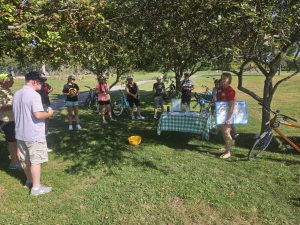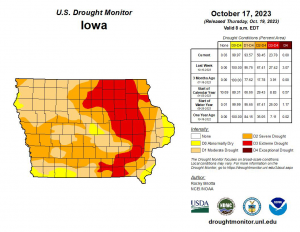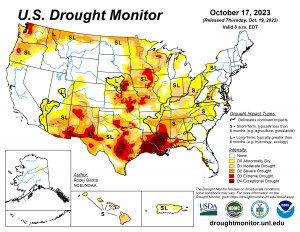CLICK HERE for the latest market quotes from the Iowa Agribusiness Network!
CLICK HERE for the latest market quotes from the Brownfield Ag News Network!
CLICK HERE for the latest market quotes from the Iowa Agribusiness Network!
CLICK HERE for the latest market quotes from the Brownfield Ag News Network!
The first of three days of hearings starts tonight (Monday) on a proposal for wind turbines in the Iowa Great Lakes area. Radio Iowa’s Dar Danielson reports. Invenergy is asking Dickinson County for a permit to build up to 101 turbines. A large turnout is expected, so the hearing was expanded to three nights, and they will be held at the courthouse in Spirit Lake. The company says the turbines will bring in millions in tax revenue.
Residents are concerned about the impact on their homes and properties in the area where tourism is a major part of their economy. Tonight’s hearing starts at six o’clock.
(Radio Iowa) – There’s still hope that the remainder of the fall will bring heavier moisture than normal that can help cut back the ongoing drought in Iowa. D-N-R hydrologist Tim Hall says recent rains weren’t enough to make a big dent, but did erase the areas of D-4 or extreme drought. “Areas of Benton and Tama County that were previously in the D-4classification saw enough rain to improve to D-3. But improvement to D-3 is still D-3,” he says. The D-3 designation is extreme drought compared to the D-4 exceptional drought designation. There is only a small sliver of the state that has no drought. Hall says late fall has not been the best time to make up a moisture deficit, though there have been exceptions.
” By the time we get to November, we see less than two inches of rain over the entire month. However, a couple years ago, we saw a very wet October, we’ve seen very wet fall months before,” Hall says. “So there’s certainly the opportunity to see noticeable and really helpful rainfall.” He says warmer temperatures would help, as they keep the ground from freezing and shutting out water. “The first thing that happens when it rains is you get water into the soil matrix and you improve soil moisture. And after that, the water can move down into shallow groundwater. That all sort of comes to an end with the ground freeze up. You tend to get very rapid runoff in ground freeze up and not as much benefit,” Hall says.
The short term forecast has the potential for some rains in the coming week.”There could be widespread rain in the one to two inch rain across a lot of the state. So there’s there’s some optimism that between now and the end of the month we could see another inch plus of rain which would certainly be great,” he says. ” I mean at now, anything we get over about three quarters of an inch in a week is above normal. So we’d love to see that.”
Hall says any rain we get before the ground freezes is a bonus in helping build up of the groundwater that has been way behind for months.
(Atlantic, Iowa) – Over 20 bicycle rides participated in the 2023 ‘Tour de Parks’ free, community bicycle ride around Atlantic organized by Nishna Valley Trails and Cass County Conservation. While this year Tour de Parks offered a shorter route option, Nishna Valley Trails President Dave Chase said he was “really impressed that everyone elected to try the long route, and found that there are places to safely ride bikes without hills in Atlantic.
Now in its third year, Tour de Parks offers participants the chance to ride on both trails and streets as they visit various parks where area organizations greet them and share information.
Ride stops and highlights:
1. The first stop this year was at Sunnyside Park, which offers tennis and pickleball courts, in addition to one of the best disc golf courses in Iowa. At Sunnyside, Atlantic City Councilperson Elaine Otte gave an update on the Splash Pad Project.
2. At Cedar Park, Atlantic Lions Club President Alan Ladd and Lion Greg Schuler shared information on their club and the club’s community projects including improvements to Cedar Park itself.
3. The third stop on the ride was the Rotary Shelter at the Schildberg Recreation Area where Rotarian Dolly Bergman talked about Atlantic Rotary’s service projects, including scholarships to high school students, and the upcoming Rotary Auction.

Tour de Parks riders enjoy cherry tomatoes and granola from Brun Ko Farm while learning about Grow Another Row and edible landscaping projects at Mollett Park
4. Mollett Park offered a chance to learn about local food efforts. Ciara Hoegh showed riders the Grow Another Row stand at the park, where anyone can share and take fresh produce during the growing season, and pointed out new raspberry plants at the park that are part of a multi-year grant to develop edible landscapes. Emily Paulsen of Brun Ko Farm handed out mid-ride snacks of fresh cherry tomatoes and homemade granola.
5. At Harl Holt Park and Bull Creek Pathway, Otte discussed improvements that have been made to the park and pathway over the past two years costing in excess of $300,000, and the further work on Bull Creek that needs to be done that will cost at least that much or more.
6. When the riders passed the Nishna Valley Family YMCA, Board Member Christina Bateman gave an update on adult and children’s recreation programs offered by the Y, and the Y’s continuing work to offer childcare and wellness programs to both adults and kids.
7. The ride ended at the Atlantic City Park, where Sarah Selders sang, Cass County Conservation and Healthy Cass County shared information on a multitude of health and wellness programs, and the Atlantic Kiwanis provided riders with a free meal and an update on their commitment to making safe bike riding accessible to all children.
The Atlantic Kiwanis are known for provide free helmets to third graders, but Steve Green shared about an exciting new development with the club. Thanks to donations of bikes, and partnership from Bike Farm, Dvorak Tire, and the Atlantic Police Department, the Atlantic Kiwanis are hoping to be able to give away bicycles in addition to helmets.
Nishna Valley Trails is a tax-exempt local nonprofit that promotes the development of recreational trails and cycling. People who support these causes are welcome to join the group. For more information on Nishna Valley Trails or to join the organization, contact President Dave Chase at barbdavechase@gmail.com or 712-249-3059.
(Atlantic, Iowa) – The 30th biannual Cass County Conservation Department’s Halloween Hike, will be held on Saturday, October 28th. During the event, you’ll follow a trail and meet the Little Red Riding Hood, her forest friends like Brown Bat, Mice, and The Wolf!
Starting at 7:00 p.m. small groups will depart from the Camblin Addition of Sunnyside Park in Atlantic, every ten minutes. The last group will depart at 8:20 p.m. and all hikers are welcome to enjoy free tasty treats and warm drinks after their hike. It is not our intent to scare or frighten anyone, but to educate and entertain people of all ages!
Pre-registration is required for this FREE event. Please call 712-769-2372 or email lkanning@casscoia.us or online at https://www.mycountyparks.com/County/Cass/Park/Cass-County-Courthouse/Events/23468/Little-Red-Riding-Hood-Halloween-Hike-7-30-PM-HIKE-TIME.aspx, to make your reservations. If you leave a message please leave name, phone number, how many is in your group and what time you wish to depart on the hike! The hike is sponsored by the Cass County Conservation Board.
“Really, you could plant anytime in the fall, just before the ground freezes,” Runkel says. “So after we start seeing leaves fall, and after we start seeing trees start to go dormant, all the way up to before freeze, it’s pretty much a good time to plant those trees.” It’s important to pick a species of tree that matches your site’s growing conditions, things like soil type, drainage, available growing space, and full sun or shade.
You can’t plant it and forget it either, as Runkel says it’ll need regular waterings. “You should be watering, especially a new tree like that, you could water it twice a week,” Runkel says. “But really, you want to simulate at least a one-inch rain. A lot of times what I’ll do, if I planted a new tree in my yard, I’ll walk out and I’ll feel the soil around it, and if it feels damp, then it’s probably okay. If it feels a little bit dry, then I’ll add some water to it.”
Don’t set out the garden hose and let it run for an hour, as that’s just wasting water. Runkel says there’s a simple trick for watering a tree gradually and sufficiently. “A lot of times what we’ll do is, we’ll just get a five-gallon bucket and then we’ll drill a small hole in the side of it,” Runkel says, “and then when you are watering your trees, you can actually just take that five-gallon bucket with that hole pointed at the trunk of the tree and then slowly let that water drain out.”
Runkel says virtually all species of trees should be safe for planting in Iowa right now, whether they’re small seedlings or larger, more established trees with a big root ball. “I typically recommend planting trees in the fall, because once they’re starting to go dormant, they’ll start to send out some of those roots to establish themselves,” Runkel says. “Then when spring comes, and we get all of that snowmelt and we get all of those spring rains, it’s going to be a really great environment for that tree to be able to come out of its dormancy and start putting more those roots out.”
Before doing any digging, call Iowa One Call at 811 to locate any underground utilities. For more tips, visit: www.iowadnr.gov/Conservation/Forestry/Urban-Forestry
DES MOINES – Today Gov. Kim Reynolds announced the signing of a disaster proclamation for Buena Vista County in northwest Iowa effective immediately through November 19, 2023. The USDA has confirmed a positive case of highly pathogenic avian influenza (HPAI) in a commercial turkey flock there.
This proclamation allows state resources from Iowa Homeland Security, the Iowa Department of Agriculture and Land Stewardship, and other agencies to assist with tracking and monitoring, rapid detection, containment, disposal, and disinfection. The proclamation also waives regulatory provisions related to commercial vehicles responding to affected sites.
The recent HPAI detections in birds do not present an immediate public health concern, and it remains safe to eat poultry products. If producers suspect signs of HPAI in their flocks, they should contact their veterinarian immediately.
(RADIO IOWA [updated]) – Developers of the Heartland Greenway carbon pipeline have cancelled the project. The Navigator C-O-2 pipeline was one of three projects proposed to ship carbon from ethanol plants to underground storage. Navigator’s 810 mile route through Iowa would have sent the liquid carbon to storage in central Illinois. Last month, South Dakota regulators denied the company’s pipeline route application for that state. Last week, Navigator asked the Iowa Utilities Board to put its Iowa application on hold.
Navigator’s C-E-O says as good stewards of capital and responsible managers of people, the company has made the difficult decision to cancel the project.
The Iowa Utility Board’s hearing on the application from a different developer — Summit Carbon Solutions — is scheduled to resume next month. Summit executives recently pushed back the estimated start date for moving carbon through their pipeline by more than a year after permit setbacks in both North and South Dakota.
Monte Shaw of the Iowa Renewable Fuels Association says Navigator’s decision was not a surprise after some of its permit applications were pulled, but Shaw says it doesn’t change the reality for the ethanol industry. “I know there are listeners out there that probably think lowering your carbon footprint is a good idea. I know you have listeners that will think that’s just silly and some made up government program,'” Shaw says. “The bottom line is our customers are saying: ‘We want lower carbon biofuels.’ Our ethanol plants have to respond to that if they’re going to stay in business. The number one thing we can do to lower our carbon footprint is carbon sequestration.”
Shaw says the Iowa Renewable Fuels Association respects Navigator’s decision and continues to support other pipeline projects. “We think that carbon capture and sequestration is absolutely vital to the future of ethanol and corn growers’ prosperity and all of that,” Shaw says. “There are other projects out there and we’re going to continue to work with them and, ultimately, I do think we will be successful.” Shaw expects some of the ethanol producers that had signed agreements with Navigator to seek another partner to capture carbon and ship it out of their plants.
“I think the two largest ethanol producers in the United States were part of (Navigator’s) system in Poet and Valero. They’re not going to sit idly by. Now I can’t tell you what they will do, which system they may go to, maybe they look at another option that I haven’t even heard of,” Shaw says, “but I would be shocked if they weren’t looking at other options.” Andrew Johnson is one of the landowners who opposed Navigator’s project. Johnson says the pipeline would have run through his Lee County farm.”We have about 200 acres of row crop and timber area right outside of West Point,” he says. “It would have cut diagonally through all 200 acres.” Johnson says he’ll never again take his property rights for granted.
“We never had an opportunity to discuss with Navigator as far as plotting where it should go. They basically just said: ‘This is where it’s going to go and if you don’t like it, we’ll use eminent domain as a resource to obtain your property,'” Johnson said. “…I didn’t realize that there was an opportunity where a company could come into this state and literally take my land away…I thought it was ours and we bought it and that was the end of it, but we’re going to be relentless in our pursuit to change laws in legislation so this will never happen again. It should never have happened to begin with.”
Matthew Ung — chairman of the Woodbury County Board of Supervisors — says he’s heard from landowners in his northwest Iowa county who were concerned that Navigator would improperly seek eminent domain authority to seize their land for the pipeline. “These are fundamentally private projects that I think everyone exept the governor’s office seems to realize are not real public utilities and so that’s why there’s been such opposition,” Ung says. “It’s not necessarily on the means or the fact that it’s being done, just the fact that it’s being portrayed as something that it’s not.”
Ung, who is a Republican, has been a Woodbury County Supervisor for nearly nine years.
(Atlantic, Iowa) – Farm Credit Administration (FCA) Board Member Glen Smith, of Atlantic, visited with KJAN Friday morning (Oct. 20), about the recently passed Young, Beginning and Small (YBF) Farmers and Ranchers program. Smith, who flew-in from his post at Washington, D-C last weekend, said the program is designed to assist young farmers in securing seed money to get into the business. Smith explained the FCA is the Federal financial regulator for the Farm Credit System.
The FCA has offices in every state in the country. There are 62 institutions and thousands of branch banks around the country, as well. Smith says Oct. 12th was National Farmer’s Day, which brought the average age of farmers nationally, is estimated to be 59.5-years. The next Ag Census in 2024 is expected to show that age is now closer to 60 or beyond. That’s become a real national concern for Ag Policy makers.
A Bipartisan effort led to funding for the YBF program, but it didn’t come quickly.
Glen Smith says the final result was a strengthening of controls, and a review of the current programs.
The YBF program, he says, is designed to be customizable to the diverse agricultural industries across the country.
Lending for the program is made through local financial institutions, including branch offices in Harlan, Red Oak, Creston and Perry. The Federal Land Office in Atlantic was eliminated several years ago. The FCS system, he says is best poised to meet with young farmers and ranchers, help them deal with some of the challenges they face and in answering their questions.
The goal Smith says, is to make getting seed money for farm operations less intimidating, and foster better cooperation with the FSA and USDA. For more information contact your local Farm Credit institution.
(NWS/Des Moines, Iowa) – The latest U-S Drought Monitor report from the National Weather Service in Des Moines, shows drought conditions improved in portions of northern and eastern Iowa during the past week. The report, issued Thursday, Oct. 19th, showed none of Iowa’s 99 counties are in an Exceptional Drought (D4). Portions of eastern Iowa are in an Extreme Drought (D3). Severe Drought (D2) conditions are found outside those counties in an Extreme Drought, and extends across much of southern and west central Iowa, to include the extreme northern, western and southwestern portions of Cass County, all of Pottawattamie, Harrison and Shelby Counties, and portions of Audubon, Guthrie, Adair, Mills, Montgomery and Adams Counties.
Moderate Drought (D1) or Abnormally Dry (D-O) conditions exist in areas of the State not already covered by the D2, D3 or D4 Drought conditions. Officials say the 30-day precipitation totals are now above normal for much of northwest Iowa and eastern portions of the State. The largest deficits are across southern Iowa. The seven-day precipitation forecast call for dry conditions this weekend, with an increasing threat of rainfall into next week.
The eight-to 14-day outlook indicates a better chance of below normal temperatures across Iowa, with near normal precipitation during that time frame. The bottom line: Drought conditions are expected to persist across Iowa through the end of this month.
 (Click on the graphics to enlarge)
(Click on the graphics to enlarge)
(Shenandoah, Iowa) – The Iowa Department of Natural Resources (DNR) is partnering with Optimal Aquafeed and Page County Conservation Board to stock rainbow trout at 9 a.m. this Saturday, October 21 in RAPP Park, outside Shenandoah. Approximately 750 rainbow trout ranging from 0.75 lbs to 4.0 lbs. from Optimal Aquafeed will be stocked by Iowa DNR staff in a small borrow pit on the RAPP Park property. A second stocking of approximately 500 rainbow trout is planned for November.
Anglers must have a valid fishing license and pay the trout fee to fish for or possess trout. The daily limit is five trout per licensed angler with a possession limit of 10. Children age 15 or younger can fish for trout with a properly licensed adult, but they must limit their catch to one daily limit. The child can buy a trout fee which will allow them to catch their own limit of five trout.
This is the third year of this successful partnership that provides a unique fishing opportunity to southwest Iowa anglers.